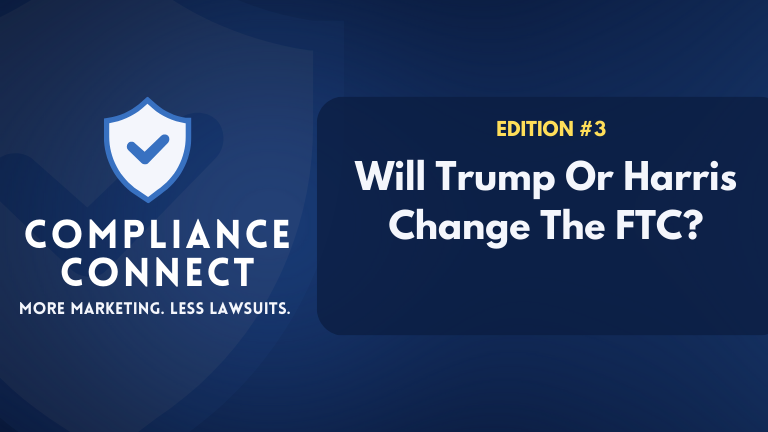Good morning! This is the third edition of the Compliant Connect newsletter.
The goal is simple: to keep you in the loop on what the FTC and other regulatory agencies are up to so that you can protect yourself.
These newsletters will land in your inbox twice a week – Mondays and Thursdays.
Remember: this is NOT legal advice, only information!
The big news story this week happened on Tuesday night. Vice President Harris and former President Trump faced off in an important presidential debate.
While they didn’t talk about the FTC, the winner will have an IMPACT on the agency.
In this issue we’ll explore the implications of the election on compliance, along with important compliance tips from attorney Greg himself!
Here’s what we’ll cover…
- 🏛️ Do The Rules Change If Trump Wins…
- 😂 Can You Be Funny And Compliant…
- 🤖 Can An AI Chatbot Hallucinate You Into Trouble…
- 📞 Important Telesales Rules…
- 📑 A Mistake That Can Get You Sued By Happy Customers…

Compliance Digest: Will Trump Or Harris Change FTC Compliance Rules?
The FTC didn’t come up at Tuesday’s debate. However, the winner will have an opportunity to make their mark on the agency.
What kinds of changes could we expect, and what does it mean for businesses and marketers?
Some people believe that if Trump gets elected, there will be BIG changes with the FTC and other regulators.
Some even believe that businesses and marketers will be able to say whatever they want!
Is this true? Let’s look at the facts.
TLDR:
- The leadership of the FTC might change
- The FTC’s big-picture focus could change, especially around anti trust
- The people doing the day to day work won’t change
- The underlying laws probably won’t change
- Courts will probably continue to be more hostile to regulators
- You’ll still need to follow the rules regardless of who wins
#1 – FTC Leadership Might Change
The president has the power to appoint the chair of the FTC. Lina Khan, appointed by President Biden, holds that position right now.
Harris might keep the current chair since they belong to the same party.
She might also make a change. There have been reports that she is being urged by some of her donors to replace Lina Khan.
If the Republicans take control of the Senate, which they are favored to do, then she would have to appoint someone who could win the votes of Republicans who are skeptical of government regulations.
If Trump wins, he’ll pick a new leader for the FTC who matches his ideas, just like he did in his first term.
This person will likely have different priorities than Lina Khan. Which leads us to…
#2 – FTC Priorities Might Change…
Under the leadership of Lina Khan, the agency has prioritized anti trust.
The FTC has sued companies like Amazon for “maintaining monopoly power.” They’ve also passed new rules, such as the ban on non-competes, to promote competition.
Republican members of the FTC, along with Republicans in congress, have opposed many of these actions.
If Trump appoints a new chair that aligns with the views of most Republicans, then the FTC will deemphasize anti trust. They might drop or settle some ongoing lawsuits and roll back some recent rules.
#3 – …But Not As Much As You Might Think
Many of the actions the FTC takes have support in both parties. For example, the recent FTC rules on fake reviews & testimonials were approved by a unanimous vote from both Republican and Democratic committee members.
There are even Republicans who like the FTC’s recent anti trust focus.
For example, Trump’s running mate JD Vance said in February that, “I guess I look at Lina Khan as one of the few people in the Biden administration that I think is doing a pretty good job.” He specifically praised her on anti trust issues.
In 2020, during the Trump administration and led by a Trump-appointed chair, the FTC sued Facebook for anti-trust violations.
The FTC’s anti-trust focus might continue even if Trump appoints a new chair.
#4 – The People Handling Investigations Probably Won’t Change
While the chair of the FTC matters, the people who actually handle investigations and decide who to file lawsuits against are usually career staff who have been there for years.
That means regardless of who wins the election and appoints the next FTC chair, most of the DAY-TO-DAY work would stay the same.
#5 – The Underlying Laws Probably Won’t Change
The Federal Trade Commission Act— the law that says what businesses can and can’t do in their ads—won’t change without a vote from Congress.
These lawsuits that we talk about in this community are brought because the targets are accused of violating parts of the FTC Act.
Regardless of who wins the presidential election and which parties control congress, there’s no indication that the FTC Act will change.
That means the basic rules prohibiting misrepresentations and other deceptive practices probably won’t change.
#6 – Courts Will Probably Continue To Be More Hostile To Regulators
Republican presidents tend to appoint judges who are skeptical of government regulations.
For example, the recent string of Supreme Court decisions weakening regulatory agencies have been driven by Republican-appointed justices.
If Trump wins the election, and the Republicans take control of the Senate, then we could expect more appointments of judges skeptical of regulators to be confirmed.
If Harris wins and Republicans control the Senate, it’s not clear if she’ll get to appoint any judges at all.
If the Democrats hold the Senate, then she would be able to appoint judges. However, it’s unlikely that there would be enough vacancies to change the current balance of the court.
Bottom Line
While it is true that the upcoming election impacts the FTC, for the vast majority of the readers of this marketers and business owners will still face the same level of risk with lawsuits if they are NOT compliant.
Remember: The FTC is NOT the only risk. There are other agencies, state AG’s, class action lawsuits and more.
Our advice is the same: learn the rules. Follow the rules. Stay informed of any changes.
For more on the election’s implications for compliance, check out this episode of the Don’t Say That podcast.
Ask Greg Mailbag #1
FTC attorney Greg Christiansen from Guardian Law periodically answers questions from members of our community.
Gerald: “Let’s talk about using Satire (humor) in content or advertising. I see a lot of this. But is it compliant?”
It all depends.
You can’t joke around that people will make a million in the first month, and look for protection. But if you are light in your ads, and it is evident to the reasonable, rational person, then you can have some fun with your advertisements.
It’s all about the NET IMPRESSION you leave.
If clients collectively interpret your ad as a guarantee or return on investment, even though done with satire, then your advertisement is not compliant.
Andrew: If I have an AI chatbot on my sales page and I have trained it with compliantly answered questions, am I liable for non-compliant statements it makes to prospects? Sometimes chatbots hallucinate …
Ha ha. That is the innate problem with AI, it is not always reliable. Ask a group of attorneys in New York who filed court documents solely based on AI, which included case law that did not even exist.
Unfortunately, when you utilize any resources, AI, Affiliate, etc., you are liable if it is on your website or in your advertisements.
So if your AI is giving incorrect, non-compliant answers, you ARE liable.
James: “I know you have to keep any call recording for 2 years when you take payment on the call. Is this requirement removed if you pause the recording when you take the card number? This would make things way easier to manage for us. Thanks!”
The TCPA requires you to retain calls for 24 months if you are authorizing a credit card over the phone. Merely stopping the recording at that point if you are collecting payment over the telephone, does not solve the issue.
The way you can solve this is by accepting payment online, instead of over the telephone. This way, the authorization is done online and NOT over the phone.
You can do this by emailing the client a link where they can go in and put their credit card information, and give authorization online and not over the phone. Then you don’t have to keep the call for 2 years.
If YOU have any questions about the FTC, rules and regulations, compliance best practices, and more, please send your questions to support@naoac.com with the subject line Newsletter – Question For Greg
Did You Know…
If you sell over the phone, you must keep a record of every sales call for 5 years! For more details, look at the record keeping requirements in the Telemarketing Sales Rule.

Quick Compliance Tip: Don’t Get Sued By Happy Customers
Marketers love using testimonials because they help customers feel confident that they’ll get the results they want from the product.
However, most marketers violate FTC rules with their testimonials AND open themselves up to lawsuits.
Greg talks about how one of his clients was SUED by one of their own successful customers who had given them a testimonial.
The client ran a product launch and used a bunch of true testimonials in their launch. However, they never got written permission to use these testimonials.
At the end of the launch, they revealed that the launch had earned tens of millions of dollars. One of the women who had given a testimonial heard, and she found out that her testimonial, face, and likeness had been in all their marketing.
She sued them for a portion of their revenue that she claimed was due to her story. This led to an EXPENSIVE legal battle.
That’s why you need to get a proper release and authorization BEFORE using a testimonial. Customers must sign a document allowing you to use their testimonial, picture, and story in your marketing.
Greg also likes to include an affidavit confirming its truth and accuracy.
This may seem trivial, but I’ve seen it go wrong for those who didn’t.
Not only will this prevent customers from suing you, but it will also keep you COMPLIANT.
After all, federal and state privacy laws MANDATE written permission before using someone’s name, picture, or experience in any commercial context.
